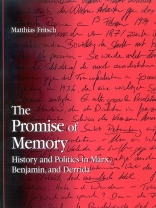Argues for a closer connection between memories of injustice and promises of justice as a means to overcome violence.
Rereading Marx through Walter Benjamin and Jacques Derrida, The Promise of Memory attempts to establish a philosophy of liberation. Matthias Fritsch explores how memories of injustice relate to the promises of justice that democratic societies have inherited from the Enlightenment. Focusing on the Marxist promise for a classless society, since it contains a political promise whose institutionalization led to totalitarian outcomes, Fritsch argues that both memories and promises, if taken by themselves, are one-sided and potentially justify violence if they do not reflect on the implicit relation between them. He examines Benjamin’s reinterpretation of Marxism after the disappointment of the Russian and German revolutions and Derrida’s ‘messianic’ inheritance of Marx after the breakdown of the Soviet Union. The book also contributes to contemporary political philosophy by relating Marxist social goals and German critical theory to debates about deconstructive ethics and politics.
Содержание
Acknowledgments
Abbreviations
Exordium
Introduction
1. Benjamin’s Reading of Marx
Remembering the Instituting Violence of Capitalism
The Primacy of Politics over History
Revising the Question of History
Benjamin’s Critique of Marx’s Teleo-Logic
Messianic Time: Seizing the Moment
Secularizing Messianism
Four Issues in the ‘Theses’
2. Derrida’s Reading of Marx
Benjamin and Derrida: Common Starting Points
Two Ways to Inherit Marx’s Promise
The Empirical and the Transcendental
The Promise of Repetition
Four Features of the Quasi-Transcendental
Modernity, Trauma, and Deferred Action
Responsibility in Disjointed Times
Why Marx’s Messianism Needs the Messianic
How to Tell Good from Bad Ghosts
Postutopian Marxism: Kantian and Deconstructive
3. The Critique of Violence
Law as Violent Means
Oscillation of Instituting and Conserving Power
Parliamentary and Radical Democracy: How to Make the Revolution Permanent
Victor-History and Its Messianic Cessation
Depositing: The Finitude of Power
Pure Means: The Proletarian Strike
Benjamin’s Utopian Ambiguities
Depositing and Iterability in the Founding of a State
Justice and Singularity: Derrida’s Objections to Benjamin’s Critique
The Disunity of Victor-History
4. The Claim of the Dead on the Living
Critique of Cultural History
Commodified Culture as Fetish
Reading the Voice of the Nameless in History
Constructing a Montage of History’s Rags
The Anteriority of Responsibility
The Absolute Victim
Why Derrida’s Injunction Needs Benjamin’s Claim
Why Benjamin’s Claim Needs Derrida’s Injunction
Notes
Bibliography
Index
Об авторе
Matthias Fritsch is Full Professor of Philosophy at Concordia University, Montreal. Among other books, he is the author of The Promise of Memory: History and Politics in Marx, Benjamin, and Derrida, also published by SUNY Press.












